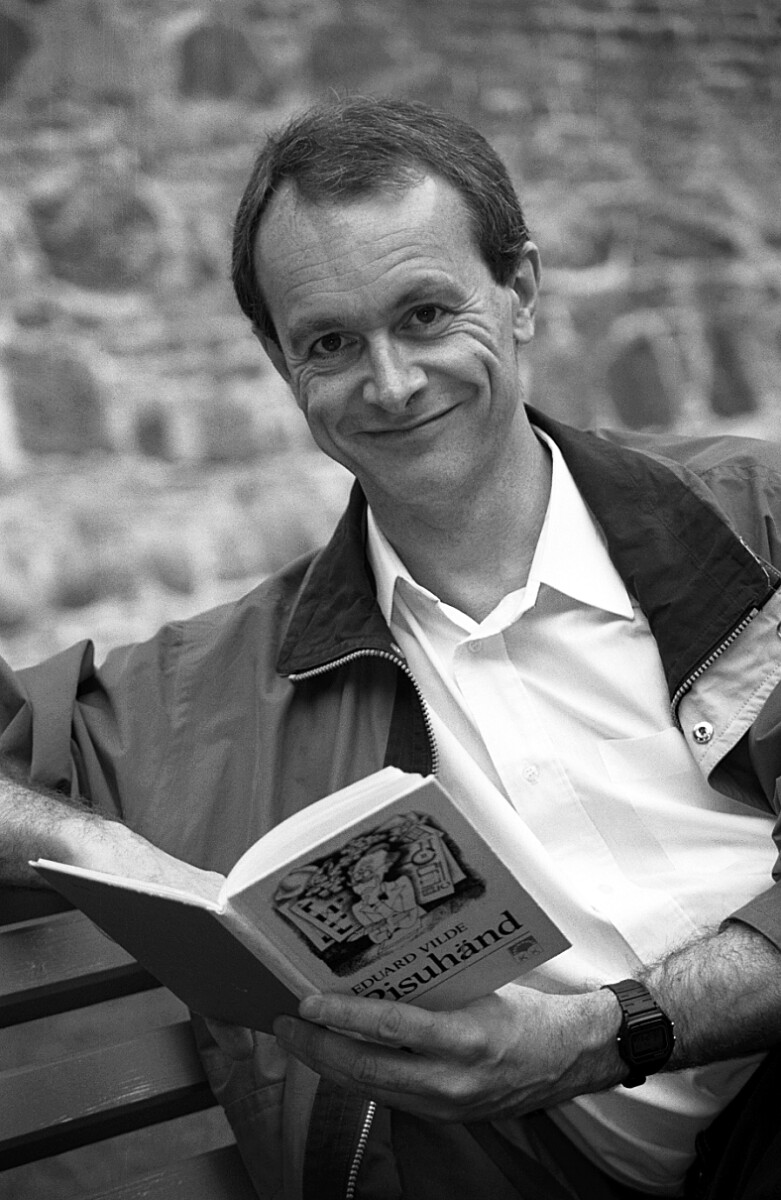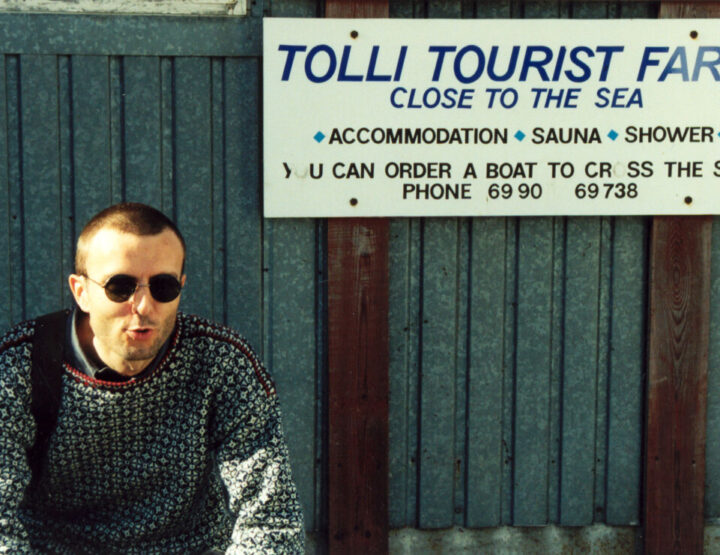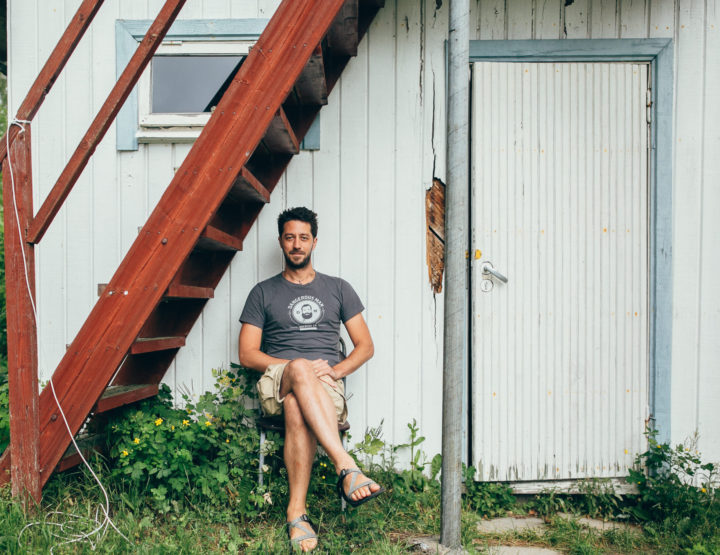In the beginning of the 90s, this person became acquainted with a few Estonians freshly arrived in Paris. These humble notes gather together, in chrono-illogic order, some rather futile recollections from the ensuing inexorable chain of events.
My first acquaintance with Ristikivi came through music. I was preparing a recital, scheduled for June 1994, with a programme composed of songs from various European countries, from Ireland and Scotland through Switzerland, Italy and France to Czechoslovakia, and some others. With the enthusiasm of the neophyte (my first trip to Estonia had taken place in the summer of 1993, and I had just embarked on studying the language), I was eager to add something from Estonia to my programme.
I quickly gave up looking for some already existent music and so I commissioned a short cycle from Helena Tulve, who had been living in Paris for more than two years at that time. She undertook very seriously the task of finding a suitable text (in fact I can testify that she always pays extreme attention to the choice of the texts that she sets to music) and eventually she settled on the first three poems from Ristikivi’s Sõnajalad.
So, I guess I must have come across Ristikivi’s name for the first time at the end of 1993, around Christmas. Anyway, I certainly knew it at the time of my second trip to Estonia (during which I sang with the medieval music ensemble Lac et Mel in Hortus Musicus’s festival), as I bought Hingede öö in a bookshop in Kuressaare, in February of 1994, for the (to my mind) pathetic price of one Estonian crown, and I can see no reason for being attracted by the unassuming yellow dust-jacket of Eesti Raamat’s edition other than a prior familiarity with the author’s name.
As with so many other Estonian books during those years, I read a few sentences with great effort, and then decided that it would be wise to wait a little bit. Nevertheless, I bought several other books by Ristikivi, among them the poetry collection Inimese teekond, then the Chronicles trilogy and the Biographies trilogy, in the summer of 1994.
Meanwhile, I had sung Helena’s pieces. It was a very demanding experience, as her musical language was quite new for me (the singer must also play the claves, which added some stress!), but I was enthralled by their beauty. I have had few opportunities to sing them since, but I would welcome one. I had also translated the poems into French, and I was perplexed by the fact that Helena was not receptive to the last one and had decided against its inclusion in her cycle. For me, this last poem brought a very fitting contrast to the previous texts, a little bit like the excerpt of Saint Paul’s epistle to the Corinthians concluding Brahms’s cycle Vier ernste Gesänge. But art is not all about what I deem to be logical reasons, symmetry and harmony (an Estonian friend of mine, an architect, regularly teases me about the boring balance I allegedly bring to all the photographs I take). Anyway, from then on I felt tied to Ristikivi, and I began to collect his books as exhaustively as I could.
At the same time I had also selected, for various fortuitous reasons that I no longer clearly remember, a few other writers, whose books I steadfastly bought whenever I happened upon one of them. One of these writers was Madis Kõiv, whom I would eventually regard as the author I wanted to translate – but for me his books would obviously remain undecipherable for many years to come!
On the contrary, I soon managed to read Ristikivi’s books, first of all Mõrsjalinik, then the three Chronicles novels, and the idea of translating something formed immediately (the long delay between the concept of the idea and its final completion is typically ollivryesque). I reflected that a lot of historical novels are offered in French bookstores, and the idea of adding Ristikivi’s trilogies to that lot did not seem so bad.
With the dull logic I have already confessed to indulging in, I decided to deal with first things first, and opted for chronological order. So I translated about half of Põlev lipp (The Burning Flag), forgot about it for some time, reread it and was appalled by what I read. I was learning the trade the hard way (is there any another way?), and also the fact that the easier the original seems to be, the greater the chances are that the translation will be poor. Mine was abysmal. At about the same time, I took Antoine Chalvin’s literary translation course in INALCO (the Institute for Eastern Languages and Civilizations in Paris), which, due to the paucity of students at that time (I am glad to hear that nowadays things look brighter), often amounted to private lessons. There I got hints about the problems I was struggling with, the main one being that, like most beginners of course, I was writing my own book. By that time (here there may be a two or three years’ discrepancy, I am not quite sure), I had already embarked on another project and was translating Andrus Kivirähk’s Liblikas. This one has also been extremely long in the making, and I am completing a last revision at the time I write these lines.
Translating Liblikas was an obvious decision for at least three reasons. Firstly, I loved the book. Secondly, I read it while myself engaging in some theatrical activity in Paris (singing and dancing in a Molière production), and this translation was a good outlet for an engrossing experience. Thirdly, I had come to grips during the preceding summer with Eduard Wilde’s Pisuhänd, and although I had concluded that I did not feel able to translate it satisfactorily, the theatrical virus had made its first attack.
The next incentive came from the Nordic festival “Les Boréales” in Caen (Normandy), where Estonia was the main guest in 2002. As each year, the festival intended to commission a theatrical translation, and I asked my friend Tanel Lepsoo, a specialist in modern French theatre, for sure, yet not unaware of the Estonian repertoire, for suggestions. Uncertain about the orientations the organizing team would favour, he came back with two: Madis Kõiv’s Küüni täitmine and Jaan Tätte’s Sild.
“Les Boréales” eventually decided to publish another play, Eva Koff’s Meie isa, a proposal they received before I had even managed to read the texts Tanel had sent me. Nevertheless, thanks to this initial impulse, both Tätte’s and Kõiv’s plays were eventually translated. Le Pont was bought by the Estonian Drama Agency – a theater in Québec had shown interest –, and La Grange was commissioned by La Maison Antoine Vitez, a French organization dealing with theatrical translations.
Confronting such an author as Madis Kõiv is a unique experience, and the depth of his texts is a challenge for which, once more, I was unprepared. Although depth is the first word coming to my mind, I should speak rather of wholeness: as is probably the case with all great authors, the fabric of his texts is so inextricably merged with their content that it seems impossible to dissect the whole into various “components”. A breathtaking experience for the reader, it is an insuperable task for the translator, unless one finds the source from which the words flow, and speaks in turn from that very same source.
This, of course, does not mean that there will not be a long work of amending and polishing, but rather that if at some stage I am not intoxicated with the fallacious feeling that I could have written this text myself, having a try at a translation is simply not worth while. This may explain why, speaking at the invitation of Janika Kronberg, on the occasion of Ristikivi’s 93rd birthday, about the translation of Põlev lipp and my other projects, when asked if in my opinion Kõiv’s language presented special difficulties, I answered negatively: what he writes is difficult, but the language alone cannot be appreciated for its own sake.
Of course, publishers ready to embark on a project involving both an obviously difficult author and a translator presumptuous enough to feel that he, himself, could have written the text he wishes to translate, must be few and far between! I think theatre directors are nowadays more daring, and I would therefore like to acknowledge the publication of the first volume of Madis Kõiv’s plays by the publisher Akkon. This fills an obvious need. When Mart Trummal disclosed this project to me two years ago, I unconsciously dismissed the news as “too good to be true”. Shaming my doubts, the first book is now on my table, containing mainly texts I had not read before, and the next volumes are already eagerly awaited.
As these notes draw to an end, I would like to devote the last few lines to thank first of all the “Traducta” programme, from whose largesse I have benefited (most recently, for the translation of Naksitrallid, which French children should see on stage this spring), and more personally Ilvi Liive and Harri Moritz who, in their quality of Estonian Literature Information Centre, have always been the most exquisite of interlocutors.
© ELM no 24, spring 2007




